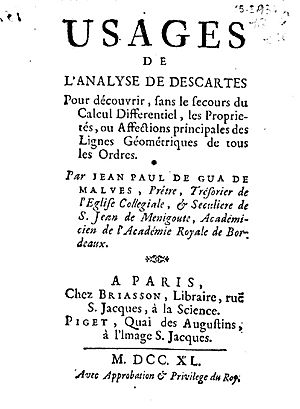Jean Paul de Gua de Malves facts for kids
Jean Paul de Gua de Malves (born in 1713 in Malves-en-Minervois, France; died June 2, 1785, in Paris) was a French mathematician. He made important contributions to the field of analytical geometry. This is a branch of math that uses algebra to study geometry.
In 1740, he published a book about how to use analytical geometry. He showed how to find things like tangents, asymptotes, and special "singular points" on algebraic curves. He did this without using differential calculus, which was a new and complex math tool at the time.
De Gua de Malves also explained how these special points and "isolated loops" on curves changed when viewed through conical projection. He also provided a clear proof for Descartes's rule of signs. This rule helps mathematicians figure out how many positive or negative roots a polynomial equation might have.
A Friend to French Thinkers
Jean Paul de Gua de Malves knew many important French thinkers of his time. These thinkers were called "philosophes" during the period known as the Ancien Régime.
Working on the Encyclopédie
He was one of the first people to work on a huge project called the Encyclopédie. This was a very famous encyclopedia published in France. It aimed to gather all human knowledge in one place.
De Gua de Malves was an early editor for the Encyclopédie. Later, another famous thinker, Denis Diderot, took over his role. Some people, like Condorcet, even said that de Gua de Malves was the one who first asked Diderot to join the project.
In December 1746, Jean-Paul de Gua de Malves and Jean le Rond d'Alembert started getting paid for their work on the Encyclopédie. Diderot joined them just a few weeks later. He officially became the editor on October 16, 1747.
When de Gua de Malves passed away, Diderot called him a "profound geometrician." Condorcet gave a speech praising him at his funeral.
Recognized for His Work
In 1743, Jean Paul de Gua de Malves was elected as a Fellow of the Royal Society. This is a very old and respected group of scientists in London, England. Being a Fellow means you are recognized for your important contributions to science.
See also
 In Spanish: Jean-Paul de Gua de Malves para niños
In Spanish: Jean-Paul de Gua de Malves para niños
- De Gua's theorem
 | Mary Eliza Mahoney |
 | Susie King Taylor |
 | Ida Gray |
 | Eliza Ann Grier |


